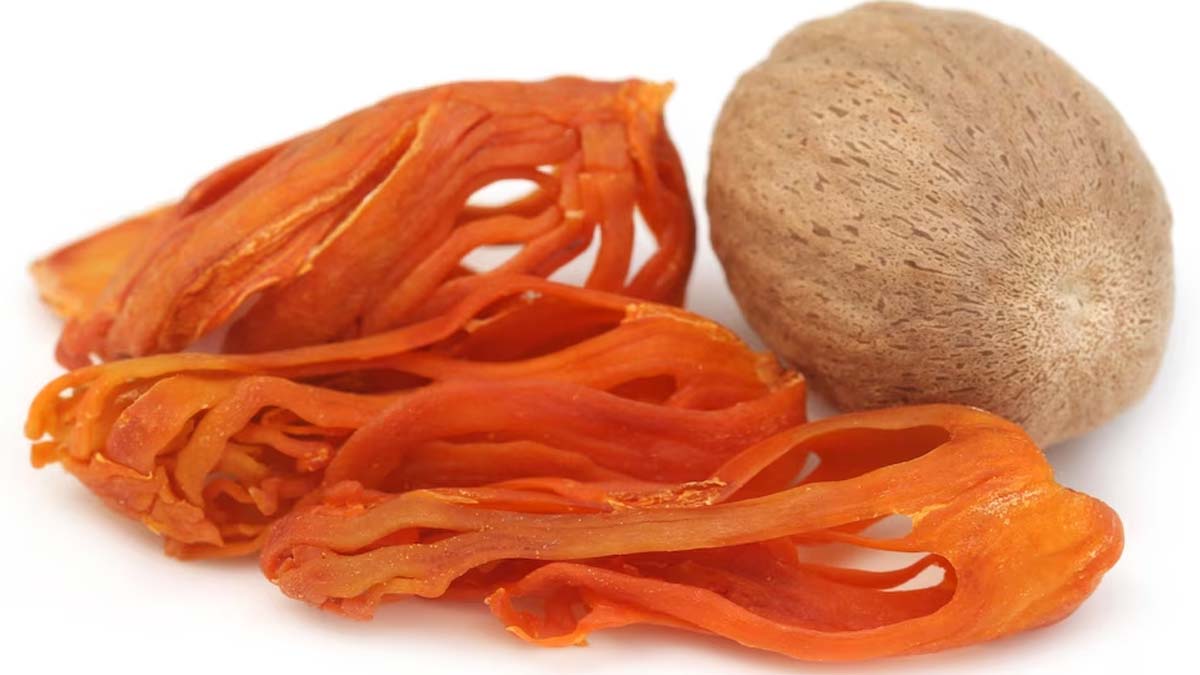
Mace, the crimson-coloured aril that surrounds the nutmeg seed, is a spice with deep roots in Indian cuisine. Beyond their culinary appeal, mace blades have a wealth of potential health advantages. Mace has a pleasant, somewhat spicy flavour and is a staple in Indian kitchens. It is an essential component of many spice blends, giving depth and richness to foods like biryani, garam masala, and rich curries. Mace gives a distinct aroma and taste to Indian cuisine.
Table of Content:-
Digestive Aid
Mace has been traditionally used in Indian cuisine for its digestive properties. It is believed to stimulate the digestive system, promoting the secretion of digestive enzymes and easing indigestion. Including mace in your meals may contribute to a smoother digestion process.

Also read: From Turmeric To Black Pepper, Indian Spices And Their Health Benefits
Anti-Inflammatory Properties
As per journal Molecules, the compounds found in mace, including myristicin and elemicin, have demonstrated anti-inflammatory effects. In Ayurveda, the traditional Indian system of medicine, mace is often used to alleviate inflammation and promote overall well-being.
Rich in Nutrients
Mace is a good source of essential nutrients, including vitamins and minerals. It contains vitamins like A, C, and B-complex, as well as minerals such as calcium, iron, and magnesium. Integrating mace into your diet can contribute to a well-rounded nutritional profile.
Stress Relief
The aromatic compounds in mace are thought to have mild sedative properties. In Ayurveda, mace is sometimes recommended to help alleviate stress and induce a sense of calm. Including mace in your cooking may offer a fragrant and soothing experience.
Dental Health
Mace has been associated with potential benefits for oral health. It possesses antimicrobial properties that may help combat oral bacteria, contributing to better dental hygiene. However, it's essential to note that mace should be consumed in moderation as part of a balanced diet.
Respiratory Health
In traditional medicine, mace has been used to address respiratory issues. It is believed to have expectorant properties, which may help relieve coughs and promote respiratory health. Incorporating mace into warm beverages or dishes during colder seasons may provide a comforting effect.
Also read: Spices, Honey, or Alcohol: What Really Relieves Sore Throat
Menstrual Health
Mace has been traditionally used to address menstrual discomfort. Its anti-inflammatory properties may help alleviate cramps and provide relief during menstruation. However, it's advisable to consult with a healthcare professional for personalised advice.
Culinary Versatility
Apart from its potential health benefits, mace is prized for its versatility in the kitchen. It can be used in both sweet and savoury dishes, from desserts and baked goods to savoury stews and rice preparations. This adaptability makes it a valuable spice in diverse culinary creations.
Mace blades, with their rich flavour and potential health advantages, play an important part in improving the culinary and medicinal components of Indian food. As you savour the complex aromas of Indian cuisine, you may also be benefiting from the healing benefits of mace.
Whether liked for its flavour or potential health benefits, including mace into your cooking can be a delicious and nourishing experience. As with any spice or herb, moderation is essential, and speaking with a doctor is recommended, particularly for people with specific health concerns or illnesses.
Also watch this video
How we keep this article up to date:
We work with experts and keep a close eye on the latest in health and wellness. Whenever there is a new research or helpful information, we update our articles with accurate and useful advice.
Current Version